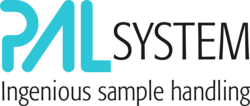PAL3-SPME-ArrowCond



Automated Determination of Fatty Acid Methyl Esters using a Method developed by PAL Method Composer
An efficient method for the generation and GC-analysis of FAME was generated using PAL Method Composer ver. 1.4. PAL Method Composer allows to rapidly generate methods by simple drag & drop operations.


New Biopharmaceuticals: Bispecific Antibody Clone Selection
Herein, we describe the development of a new high-throughput approach based on the newly introduced SampleStream Platform for performing clone selection screening, enabling selection of clones that produce the highest amount and quality of the correctly assembled bispecific antibody.






Automated Sample Prep Workflows: Save money and time
This compendium on instrumental sample preparation showcases the many proven solutions of automated sample preparation workflows for food, environmental, pharma, life science analysis, and beyond.


PAL Ingenious News January 2022



Untargeted 2DxLC-Mass Spectrometry using SWATH-DIA-Based Workflow for the Characterization of Lipid Profiles in Plasma Samples
The use of lipidomic analyses based on LC-mass spectrometry has become widespread due to its sensitivity and specificity which provides a broader picture of lipid profiles in biofluids. In this work, we combined an automated sample extraction and a two-dimensional liquid chromatography (2DxLC) system with HILIC-based class separation followed by an orthogonal reverse-phase chromatography with an untargeted SWATH-DIA workflow to accurately annotate phosphatidylcholines (PC), lysophosphatidylcholine (LPC) and etherphosphatidylcholines (PC O-) in human plasma samples.


Fully automated sample preparation for the determination of plasticizers in PVC from food contact materials and toys
The automatization not only eliminates manual lab work, it also allows an automated elaboration of optimized conditions for transesterification.



Automated Sample Preperation for LC-MS and GC-MS -Solutions for Food and Environmental Analysis
In this presentation we want to discuss an important development and a demand from analytical laboratories about the standardization and the automation of sample preparation procedures for food safety, environmental, the forensic or pharmaceutical analysis.
Presented by:
Hans-Joachim Huebschmann, PhD


Challenges and Opportunities of Sample Preparation for Complex Matrices in Liquid Chromatography coupled with Mass Spectrometer
This presentation focuses on Sample Preparation aspecting in Metabolomics and Lipidomics
Presented by:
David Ruskic and Prof. Gerard Hopfgartner, Life Sciences Mass Spectrometry, Department of Inorganic and Analytical Chemistry, University of Geneva
